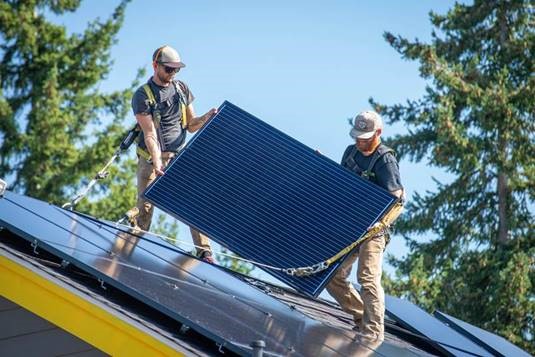As solar becomes increasingly popular, many homeowners may find themselves wondering how to evaluate solar panel manufacturers. Is there a difference between solar panel companies? And does the company you select impact your PV system potential and performance? Markus Virta, Director of Sales and Development for Washington-based Western Solar, says the answer to these questions is a resounding yes.
"Solar is a long-term investment," Virta says. "So you need both a quality product and company that will be around for the long term." Given Virta's deep experience working with solar panel manufacturers, we asked him to explain what goes into finding a great solar company. Here are his best tips for finding a solar manufacturer whose products you can count on:
1. Balance price with a company's reputation and longevity
The solar panel market is a competitive one. Startups are coming into the space every day, selling solar panels alongside more well-known players. As you consider solar panel companies, you want to balance factors such as price with the company's experience with producing solar panels, their reputation, and business longevity.
Look for a company with a successful track record of making solar panels, a solid reputation among installers and homeowners, and extended business life. That's because when you're buying a solar panel, you're entering into a long-term relationship with the company that manufacturers them. If the manufacturer offers a 25-year warranty on the module, then you want to ensure that it be around for 25 years.
Panasonic, for example, has been in business since 1918 and has been producing solar panels since 1997. "Their longevity and financial performance benefit you as a homeowner," Virta says. "You can rest assured that if you have a question or concern, you can call Panasonic, and they'll be there." It may seem simple, but Virta notes that the "solar coaster" is alive and well, with newer solar panel companies regularly going in and out of business.
2. Assess the product quality and the company's quality control process
While the price of solar panels has come down in recent years, it's a mistake to think of the equipment as an actual commodity. The quality of the product still varies between manufacturers, and premium products often outperform lower-cost panels.
Before deciding on a solar panel company, homeowners should evaluate panel technology, panel efficiency, and the materials the company uses. Make sure you're analyzing apples to apples, Virta says. For instance, as you evaluate the output of one module relative to another, check the size of the panel. If one panel has more output but is also larger, it may not actually be more efficient. Virta notes that understanding how a manufacturer controls the quality of its products is also essential.
Panasonic has strict quality control benchmarks that it requires its OEM partners to meet. If they fall short, Panasonic doesn't accept the products and prioritizes partners that meet and exceed its high standards. As you evaluate solar panel companies, ask your installer how manufacturers monitor and ensure product quality across their supply chain.
3. Ask your installer why they chose their solar panel partners
A quality solar panel installer will be thoughtful about the products they choose to recommend and install for clients. As you research solar panel companies, ask your installer about the factors they deem essential in a solar panel company. You'll undoubtedly encounter some of the expected variables previously mentioned, such as company reputation, product quality, and panel performance. But you may also be surprised at some of the other key factors that go into the installer's decision.
Virta prioritizes sustainability in both the manufacturer's product as well as supply chain. For example, he's avoided solar companies whose products require shipping modules around the world to be repaired. In many cases, the damaged panels are often destroyed.
"It's incredibly wasteful, from both the shipping perspective and the waste of raw materials," he says. His company partners with Panasonic because they provide a high-quality product, excellent warranties, and a commitment to sustainability that matches Virta's values and those of his customers.
Panasonic solar panels being installed on a Bellingham, WA home. Photo courtesy of Western Solar, Inc.
How can you ensure solar panel success?
Multiple ingredients go into building and maintaining an effective solar power system for your home. Virta says that there are three components that homeowners should consider:
The solar panel company. We've covered the importance of utilizing high-quality products and leveraging the expertise and longevity of high-quality solar panel manufacturers such as Panasonic. You'll eliminate the worry of working with a newer company and benefit from the success of a longstanding industry player.
The right installer. The best equipment won't yield results if it's poorly installed. If you want an effective PV system, you must work with a high-quality installer. As with the solar panel company, homeowners should consider the installer's reputation, customer reviews, processes, and manufacturing partners.
An optimized design. The right installer will combine high-quality solar panels and hardware with the optimal design for your power needs and budget. An installer should consider your current power usage, future power needs, environmental goals, financial expectations, thoughts on battery storage, and more.
Choose a great solar panel company. Then combine those products with a quality installer and great design—and you can't lose. You'll end up with a PV system that more than meets your power needs and an install process that exceeds your expectations.
Looking to find out more about powering your home with clean solar power? Connect with a vetted Panasonic installer in your area today and get all your questions answered with a free quote.






